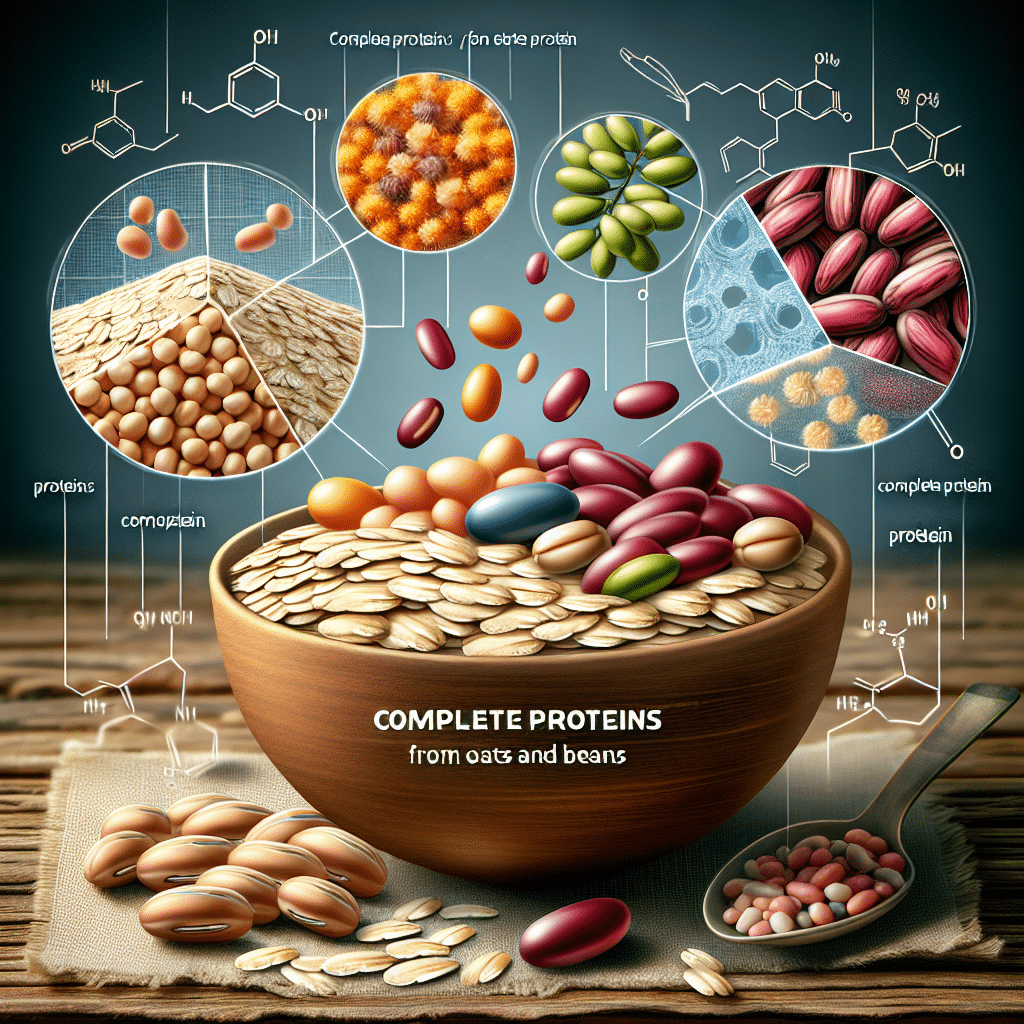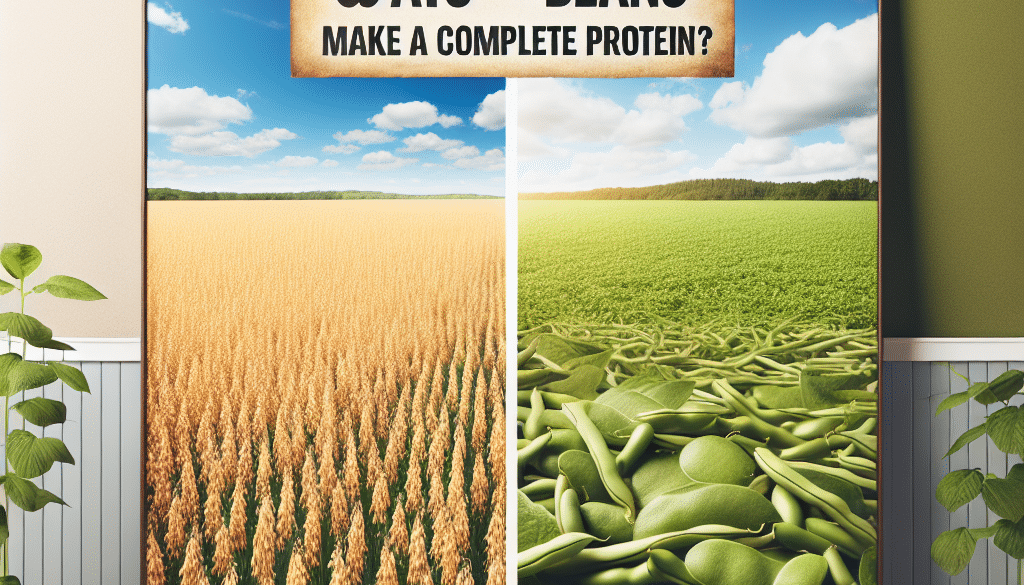Do Oats And Beans Make A Complete Protein?
-
Table of Contents
- Complete Proteins: The Synergy of Oats and Beans in Nutrition
- Understanding Complete Proteins
- The Amino Acid Profile of Oats and Beans
- Combining Oats and Beans for Complete Protein
- Scientific Evidence and Dietary Recommendations
- Practical Ways to Combine Oats and Beans
- Case Studies and Statistics
- Conclusion: The Power of Plant-Based Proteins
- Discover ETprotein’s High-Quality Plant Proteins
Complete Proteins: The Synergy of Oats and Beans in Nutrition

Proteins are the building blocks of life, essential for the growth, repair, and maintenance of our bodies. Amino acids, the organic compounds that form proteins, are vital for these processes. While animal proteins are known to be complete, meaning they contain all nine essential amino acids, plant-based proteins often lack one or more of these components. This has led to a significant question for vegetarians, vegans, and those looking to reduce their meat consumption: can plant-based foods be combined to create a complete protein? In this article, we will explore the combination of oats and beans and whether they can provide a complete protein source.
Understanding Complete Proteins
Proteins are made up of amino acids, of which there are twenty. Nine of these are considered essential because our bodies cannot synthesize them; they must be obtained through diet. A complete protein is one that contains an adequate proportion of all nine essential amino acids. Animal products like meat, dairy, and eggs naturally contain complete proteins. However, most plant-based proteins are deficient in one or more essential amino acids, making them incomplete proteins.
The Amino Acid Profile of Oats and Beans
Oats are a nutritious grain rich in fiber, vitamins, and minerals. They contain a good amount of protein but are low in the essential amino acid lysine. On the other hand, beans are an excellent source of protein and are particularly high in lysine. However, they tend to be low in methionine and cysteine, amino acids in which oats are relatively abundant. This complementary amino acid profile suggests that when oats and beans are consumed together, they can provide a balance of essential amino acids akin to that of a complete protein.
Combining Oats and Beans for Complete Protein
The concept of protein complementation involves combining two or more plant-based foods with complementary amino acid profiles to create a complete protein. By eating oats and beans together, one can achieve a more balanced intake of essential amino acids. This doesn’t necessarily mean that they need to be consumed in the same meal; eating a variety of plant-based proteins throughout the day can also ensure a complete amino acid intake.
- Lysine: Beans are high in lysine, which is limited in oats.
- Methionine and Cysteine: Oats provide these sulfur-containing amino acids that are less abundant in beans.
Scientific Evidence and Dietary Recommendations
Research has shown that a varied diet of plant-based proteins can meet the body’s needs for essential amino acids. The American Dietetic Association states that plant protein can meet protein requirements when a variety of plant foods is consumed and energy needs are met. This supports the idea that combining different plant proteins, such as oats and beans, can provide a complete protein profile.
Practical Ways to Combine Oats and Beans
There are numerous delicious and nutritious ways to combine oats and beans in your diet. Here are some examples:
- Enjoy a savory oatmeal topped with black beans, avocado, and salsa for a breakfast twist.
- Make bean burgers with oats as a binder and serve them with a side of oat bread.
- Prepare a hearty bean and oat stew, perfect for cold days.
- Create a bean salad with a sprinkle of toasted oats for added texture.
Case Studies and Statistics
Studies on vegetarian and vegan populations, who often rely on plant-based proteins, have shown that these groups can maintain adequate protein status when consuming a variety of plant foods. For example, a study published in the “Journal of Nutrition” found that a diet consisting of a variety of plant proteins was able to meet the amino acid requirements of adult women.
Statistics from the United Nations’ Food and Agriculture Organization indicate that the consumption of plant-based proteins is on the rise globally, with an increasing number of people recognizing the health and environmental benefits of plant-based diets.
Conclusion: The Power of Plant-Based Proteins
In conclusion, oats and beans can indeed make a complete protein when consumed together. This combination allows individuals to enjoy the health benefits of a plant-based diet without compromising on the essential amino acids necessary for good health. By understanding the principles of protein complementation and incorporating a variety of plant-based proteins into their diets, people can meet their nutritional needs in a sustainable and healthful way.
Discover ETprotein’s High-Quality Plant Proteins
If you’re looking to enhance your diet with plant-based proteins, consider ETprotein’s range of high-quality protein products. Their selection includes organic rice protein, pea protein, and various seed proteins, all characterized by a neutral taste and non-GMO, allergen-free attributes. With L-(+)-Ergothioneine purity over 98%, ETprotein caters to a diverse range of industries, ensuring that you have access to the best plant proteins on the market.
Whether you’re a manufacturer, trader, or just someone interested in boosting your protein intake, ETprotein’s products are an excellent choice. Contact them today to learn more about their offerings and how they can meet your protein needs.
About ETprotein:
ETprotein, a reputable protein and L-(+)-Ergothioneine (EGT) Chinese factory manufacturer and supplier, is renowned for producing, stocking, exporting, and delivering the highest quality organic bulk vegan proteins and L-(+)-Ergothioneine. They include Organic rice protein, clear rice protein, pea protein, clear pea protein, watermelon seed protein, pumpkin seed protein, sunflower seed protein, mung bean protein, peanut protein, and L-(+)-Ergothioneine EGT Pharmaceutical grade, L-(+)-Ergothioneine EGT food grade, L-(+)-Ergothioneine EGT cosmetic grade, L-(+)-Ergothioneine EGT reference grade and L-(+)-Ergothioneine EGT standard. Their offerings, characterized by a neutral taste, non-GMO, allergen-free attributes, with L-(+)-Ergothioneine purity over 98%, 99%, cater to a diverse range of industries. They serve nutraceutical, pharmaceutical, cosmeceutical, veterinary, as well as food and beverage finished product distributors, traders, and manufacturers across Europe, USA, Canada, Australia, Thailand, Japan, Korea, Brazil, and Chile, among others.
ETprotein specialization includes exporting and delivering tailor-made protein powder and finished nutritional supplements. Their extensive product range covers sectors like Food and Beverage, Sports Nutrition, Weight Management, Dietary Supplements, Health and Wellness Products, and Infant Formula, ensuring comprehensive solutions to meet all your protein needs.
As a trusted company by leading global food and beverage brands and Fortune 500 companies, ETprotein reinforces China’s reputation in the global arena. For more information or to sample their products, please contact them and email sales(at)ETprotein.com today.














